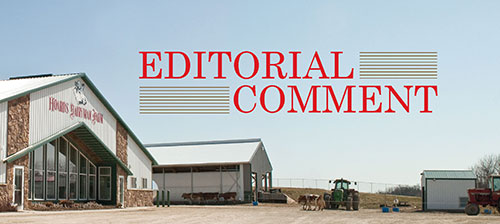
Receiving a response from a federal agency just 48 hours after submitting a significant petition is almost unheard of these days. Given that the response took place during the depths of the COVID-19 health pandemic makes it doubly eye-opening.
Unfortunately for the original petitioners, they learned USDA flat out denied a request for a hearing. While many in the dairy world stood disappointed, one contingency was relieved. In reflecting upon the situation, it time warped us back to an era when dairy regions fought fiercely over federal farm programs. We hope this recent incident is merely a blip on the radar, not a harbinger of dairy politics trying to reemerge from yesteryear. If the latter holds true, Congressional representatives will start running for the exits.
On April 27, a number of dairy cooperatives and common milk marketing agencies submitted a petition to the USDA official who oversees the Federal Milk Marketing Order system. That 13-page document established the case to set a minimum Class I price mover of $15.68 for the months of June, July, and August. There was good reason, as the May Class I mover plummeted 22% from April’s $16.64 as the COVID-19 pandemic set in.
By and large, those organizations requesting an emergency hearing to temporarily amend all federal milk marketing orders served producers who marketed milk in rather substantial Class I markets. Since the proposed measure would have only benefited the Class I portion of milk checks, milk sheds with high Class I utilization rates would have benefited at greater proportions.
On the flip side, the Upper Midwest has a meager 8% Class I market share. Minnesota and Wisconsin interests argued that Class III and Class IV represents 60% of the market nationally and that those prices also plummeted over 20% during the same window. Why give Class I prices, at only 28% of the national market, a special adjustment?
The tragedy in all of this is that every dairy farmer is suffering due to disastrous plunges in milk prices. While the spirit of the proposal is well-placed, our industry can ill afford much infighting these days as we no longer represent a major political class. The developments of this short-lived Class I proposal remind us that we need to have near unanimity to make revisions to any dairy program. Indeed, cooperation among all is needed now more than ever.










